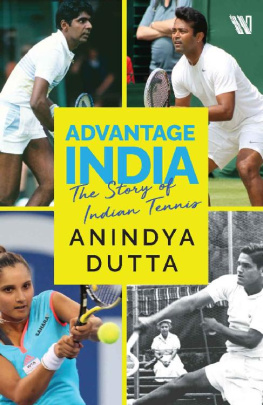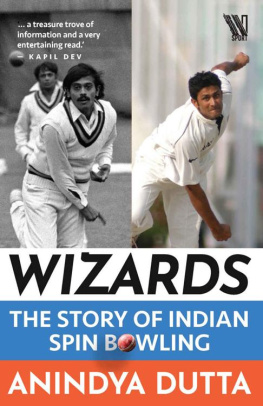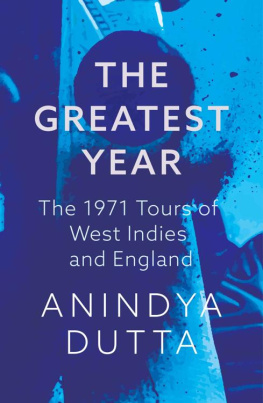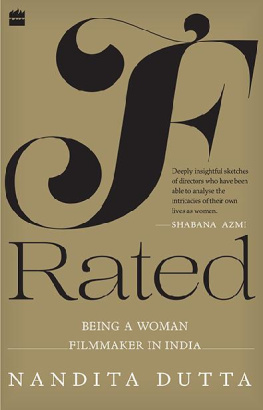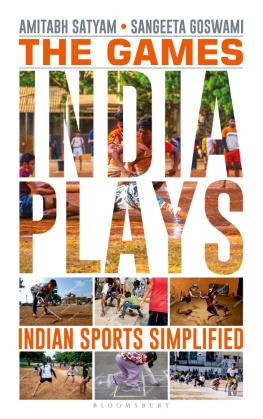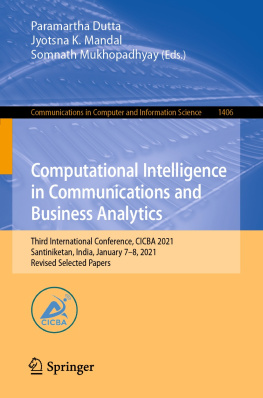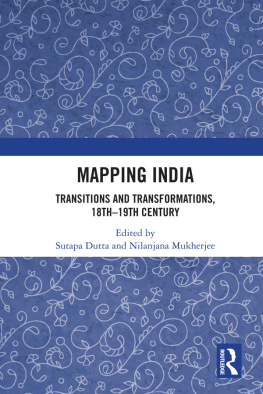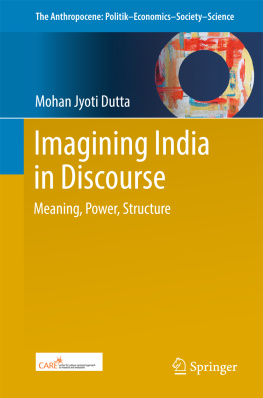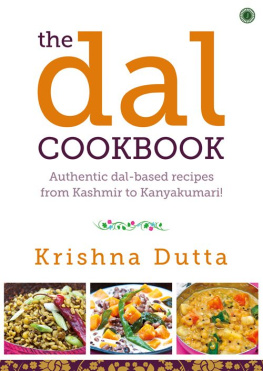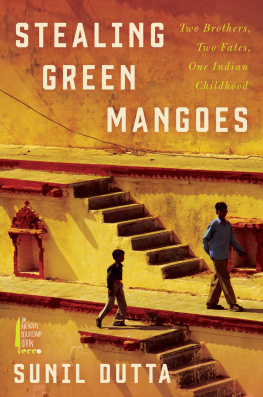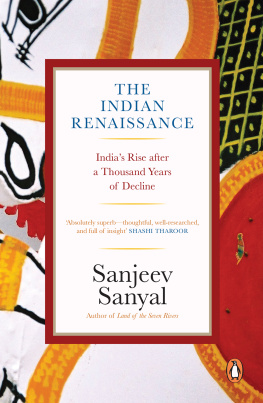Anindya Dutta - Advantage India: The Story of Indian Tennis
Here you can read online Anindya Dutta - Advantage India: The Story of Indian Tennis full text of the book (entire story) in english for free. Download pdf and epub, get meaning, cover and reviews about this ebook. year: 2021, publisher: Westland Sport, genre: Detective and thriller. Description of the work, (preface) as well as reviews are available. Best literature library LitArk.com created for fans of good reading and offers a wide selection of genres:
Romance novel
Science fiction
Adventure
Detective
Science
History
Home and family
Prose
Art
Politics
Computer
Non-fiction
Religion
Business
Children
Humor
Choose a favorite category and find really read worthwhile books. Enjoy immersion in the world of imagination, feel the emotions of the characters or learn something new for yourself, make an fascinating discovery.
- Book:Advantage India: The Story of Indian Tennis
- Author:
- Publisher:Westland Sport
- Genre:
- Year:2021
- Rating:5 / 5
- Favourites:Add to favourites
- Your mark:
- 100
- 1
- 2
- 3
- 4
- 5
Advantage India: The Story of Indian Tennis: summary, description and annotation
We offer to read an annotation, description, summary or preface (depends on what the author of the book "Advantage India: The Story of Indian Tennis" wrote himself). If you haven't found the necessary information about the book — write in the comments, we will try to find it.
Advantage India: The Story of Indian Tennis — read online for free the complete book (whole text) full work
Below is the text of the book, divided by pages. System saving the place of the last page read, allows you to conveniently read the book "Advantage India: The Story of Indian Tennis" online for free, without having to search again every time where you left off. Put a bookmark, and you can go to the page where you finished reading at any time.
Font size:
Interval:
Bookmark:
ADVANTAGE
INDIA
Anindya Dutta is an international banker-turned-entrepreneur working in the area of sports-led leadership development. He has spent the past two-and-a-half decades working in major financial marketsLondon, Hong Kong, Mumbai and Singapore. Anindya is deeply interested in sports history and is a sportswriter by vocation.
Anindyas first book, A Gentlemans Game (2017), was followed by his widely acclaimed and bestselling account of the greatest bowling spells in the history of cricket, Spell Binding Spells (2017). His next book, We are the Invincibles (2019), a fascinating account of Bradmans 1948 teams tour of England also received critical acclaim.
Wizards: The Story of Indian Spin Bowling published by Westland Sport in 2019 won the Cricket Book of the Year Award at the Ekamra Sports Lit Fest.
Besides penning books, Anindya is also a columnist for Sportstar, Hindustan Times, ESPN Cricinfo, Cricket Monthly, Cricket Soccer, Roar and Fountain Ink.
Delicately maintaining his work-write balancebanker by day and writer by nightAnindya lives in Singapore with his hugely supportive wife, Anisha and canine daughter, Olu.

First published in Westland Sport by Westland Publications Private Limited in 2021
1st Floor, A Block, East Wing, Plot no. 40, SP Infocity, Dr MGR Salai, Perungudi, Kandanchavadi, Chennai 600096
Westland Sport and the Westland logo are the trademarks of Westland Publications Private Limited, or its affiliates.
Copyright Anindya Dutta, 2021
ISBN: 9788194879060
The views and opinions expressed in this work are the authors own and the facts are as reported by her, and the publisher is in no way liable for the same.
All rights reserved
No part of this book may be reproduced, or stored in a retrieval system, or transmitted in any form or by any means, electronic, mechanical, photocopying, recording, or otherwise, without express written permission of the publisher.
This book is dedicated to Anishamy friend, philosopher, partner-in-crime, bedrock of support, and fount of inspiration for these past twenty-five years.
May the decades ahead be even more magical together.
CONTENTS
You want to have a coffee with Vijay today? was the cryptic text I received one morning six years ago from Shiraz, an old friend. As far as I knew, Shiraz was in Bangkok where he lived, and I was at work in Singapore. But I did know which Vijay he was referring to.
We had spoken a few days earlier and he had casually mentioned that he was working on a business venture with Vijay Amritraj. It turned out that both were in Singapore that day and Vijay had an hour free between meetings and was happy to say hello if I could make it to the Four Seasons at 3 p.m.
Ill be there, I replied.
That one hour turned into two and a lifetime of memories.
This is our second meeting, I told him as we sat down and ordered coffee, the first was when I was ten and you ruffled my hair and gave me this at the Madras Gymkhana Club in 1977. Vijay sat there shaking his head as he held my first autograph book open to a page that read: Love, Vijay Amritraj. Then he looked up with a smile and to my utter disbelief, recited the exact scores of each match that he had played that year in the Davis Cup tie against Australia.
I knew the scores because it held special significance for me. It had been my first glimpse of international tennis, sitting with my father on the temporary bamboo stands at the Gymkhana grounds, listening to him recount the exploits of the legendary Ramanathan Krishnan, seated on the team bench across the court.
It was also the day I had fallen hopelessly in love with the sport that I would only start playing a few years later when we moved to Cochin (now Kochi). There, a close friend, Arun Varadarajan, who had made it to the semi-finals of the junior Nationals that year, insisted I join him on the clay courts of the Lotus Club where he practised. But even then if someone had told me that I would end up writing the story of Indian tennis four decades later, I would have laughed in his face.
Fast forward three decades and four books later. A weekend conversation took place between my editor for Wizards: The Story of Indian Spin Bowling (whose manuscript he has just read for the first time)Karthik Venkateshand myself, and he asked what I wanted to write on next. Indian tennis, was my answer. But remember, Nadal is not Indian, he teased me, knowing much of my work on tennis until then had been a series of pieces over the years on Rafael Nadal. We laughed and left it at that. A month later, I was at breakfast in Copenhagen and got a call from Karthik. Congratulations! You are going to be writing the story of Indian tennis. We will discuss terms when you get back.
And thus began a fascinating roller coaster journey that culminated in the book that you hold today.
I didnt quite realise how daunting a task writing this story was going to be until I immersed myself in the research. Unlike cricket, tennis has virtually no recorded history in the country before the arrival of Ramanathan Krishnan in the 1950s other than a book written by a retired bureaucrat, P.K. Datta, and published by the government of India in 2001, titled A Century of Indian Tennis. That book is largely a quick compendium of bare statistics and often cryptic comments on players rather than a history of the sport. A hundred websites and books have since copy-pasted the work instead of making an attempt at building on the invaluable work that he did. The result is a sport whose history had gaping holes that were waiting to be filled.
The months that followed were to reveal to me long-forgotten tales that are inextricably linked to the fabric of Indian society. It was to take the story of the sport in India back to the early dawn of tennis as we understand it today. It was also to bring to life characters who had significant roles to play on the court, and very often off itroles that were to influence Indian history itself.
The stories of Sydney Montague Jacob and the Jallianwala Bagh massacre, and that of Mohammed Sleem, barrister-at-law and the greatest Indian tennis player of the pre-independence era, fascinated me, particularly the details and links I managed to unearth to bring these mens stories to life. The interactions and conversations with some of Indias best tennis players of the past seven decades would turn out to be much more than interviews, as they gave freely of their knowledge and insights into the sport itself, and that has enriched this book.
For later generation readers and fans who have grown up watching Indian tennis reach great heights in the doubles format, the section on Indians and doubles will hopefully be an insightful and nostalgic page-turner. The section on womens tennis in India will, I hope, be as much of a revelation to readers as it was to me when I wrote this book. The fact that Sania Mirza, indubitably Indias greatest contribution to the world of womens tennis and the unique phenomenon that she is, was passed on the baton from a series of lesser known but illustrious predecessors so that she could accelerate and anchor the team to a glorious finish, may come as a surprise to fans unfamiliar with the long history of the womens sport in India.
As you read this story, I hope the same sense of pride fills you as it did me when I wrote it. India may not have a Grand Slam singles champion yet, but there is far more to this story of tennis than that. The achievements of the generations of players who have wielded their racquets in their quest for national and personal pride is staggering, the stories of their sacrifices for the tricolour enormously moving, and every step they have taken on this journey has moved the story of Indian tennis towards an ever more glorious future.
Next pageFont size:
Interval:
Bookmark:
Similar books «Advantage India: The Story of Indian Tennis»
Look at similar books to Advantage India: The Story of Indian Tennis. We have selected literature similar in name and meaning in the hope of providing readers with more options to find new, interesting, not yet read works.
Discussion, reviews of the book Advantage India: The Story of Indian Tennis and just readers' own opinions. Leave your comments, write what you think about the work, its meaning or the main characters. Specify what exactly you liked and what you didn't like, and why you think so.

